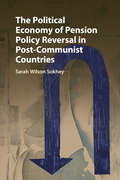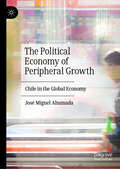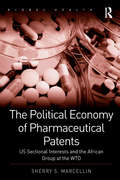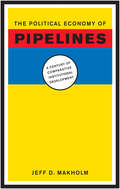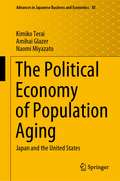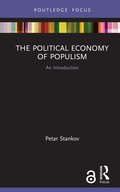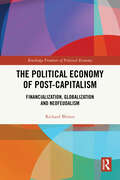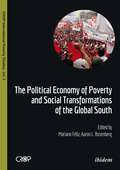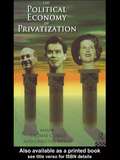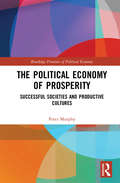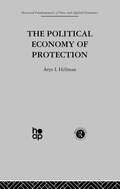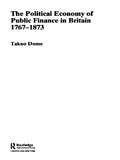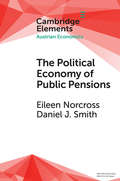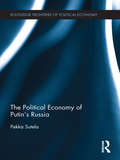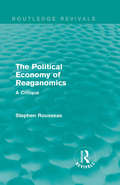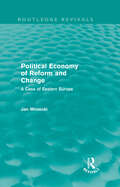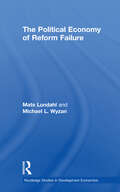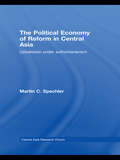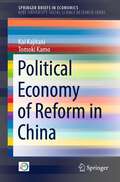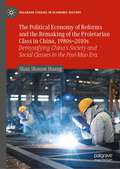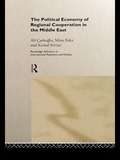- Table View
- List View
The Political Economy of Pension Policy Reversal in Post-Communist Countries
by Sarah Wilson SokheyWhy do governments backtrack on major policy reforms? Reversals of pension privatization provide insight into why governments abandon potentially path-departing policy changes. Academics and policymakers will find this work relevant in understanding market-oriented reform, authoritarian and post-communist politics, and the politics of aging populations. The clear presentation and multi-method approach make the findings broadly accessible in understanding social security reform, an issue of increasing importance around the world. Survival analysis using global data is complemented by detailed case studies of reversal in Russia, Hungary, and Poland including original survey data. The findings support an innovative argument countering the conventional wisdom that more extensive reforms are more likely to survive. Indeed, governments pursuing moderate reform - neither the least nor most extensive reformers - were the most likely to retract. This lends insight into the stickiness of many social and economic reforms, calling for more attention to which reforms are reversible and which, as a result, may ultimately be detrimental.
The Political Economy of Peripheral Growth: Chile in the Global Economy
by José Miguel AhumadaThis book provides a political economy perspective on Chile’s contemporary economic development, explaining the different stages of Chile’s neoliberal pattern of economic integration into the global economy from 1973 to 2015. Three key explanatory variables are considered: the evolution of business-state relations, US geopolitical interest in the region through the waves of trade agreements, and the political impact of the dynamics of inflows and outflows of financial capital. Although Chile is typically considered to be a successful case of a free market economy, this book presents an alternative narrative of Chile’s growth through using a Latin American Structuralist political economy perspective. While it recognises the positive results in terms of growth, it also emphasises the lack of dynamic sources for long-term development, which embeds the economy into short-term booms followed by periods of stagnation.
The Political Economy of Pharmaceutical Patents: US Sectional Interests and the African Group at the WTO (Global Health)
by Sherry S. MarcellinThis book provides a fresh, multidisciplinary, and exciting look at the making and remaking of pharmaceutical patents at the GATT/WTO, by utilising a Coxian political economy of continuity and change in the global political economy (GPE). Marcellin focuses on the role of the transnational drug industry in the making of the patent provisions in the original TRIPS Agreement and consequently, the role of the African Group at the WTO in the remaking of those patent provisions.
The Political Economy of Pipelines: A Century of Comparative Institutional Development
by Jeff D. MakholmWith global demand for energy poised to increase by more than half in the next three decades, the supply of safe, reliable, and reasonably priced gas and oil will continue to be of fundamental importance to modern economies. Central to this supply are the pipelines that transport this energy. And while the fundamental economics of the major pipeline networks are the same, the differences in their ownership, commercial development, and operation can provide insight into the workings of market institutions in various nations. Drawing on a century of the world’s experience with gas and oil pipelines, this book illustrates the importance of economics in explaining the evolution of pipeline politics in various countries. It demonstrates that institutional differences influence ownership and regulation, while rents and consumer pricing depend on the size and diversity of existing markets, the depth of regulatory institutions, and the historical structure of the pipeline businesses themselves. The history of pipelines is also rife with social conflict, and Makholm explains how and when institutions in a variety of countries have controlled pipeline behavior—either through economic regulation or government ownership—in the public interest.
The Political Economy of Population Aging: Japan and the United States (Advances in Japanese Business and Economics #30)
by Kimiko Terai Amihai Glazer Naomi MiyazatoThis book integrates the economics of aging and insight based on political economy and explores generational conflict in the context of governmental spending. This problem is general, as the Covid-19 pandemic has highlighted: lockdowns protect the elderly, but hurt the young. Policies to address global warming impose taxes on the elderly, but would bring benefits largely in the future. This book addresses intergenerational problems by placing its focus on budget allocation, taxation, and regulation. By using Japanese and US data, the authors conduct statistical analysis of whether regions with aging populations may adopt policies that generate benefits during a short period of time instead of policies that could benefit current young generations for an extended period of time. If the policy preferences of voters depend on their age, and if policy adoption by a government reflects public opinion, the change in demographic composition in a region may affect governmental policies. In an aged society, the elderly are pivotal voters. Budgets may be reallocated from policies favored by younger generations, such as education, to policies the elderly prefer, such as welfare programs. This generates an intergenerational externality problem: voters with short life expectancy do not take into consideration long-term benefits. Moreover, the current tax bases may be replaced by other tax bases that do not harm the elderly. The results reported in the book largely support these hypotheses. Evidence also shows that the gender and racial composition and institutional factors, including the extent of fiscal decentralization, are important in anticipating effects of population aging in other countries.
The Political Economy of Populism: An Introduction (Routledge Frontiers of Political Economy)
by Petar StankovThe Political Economy of Populism explores the interplay between identity, the economy and inequality to explain the dynamics of populist votes since the beginning of the 20th century. The book discusses the political and economic implications of populist governance using data on populist incumbencies and linking it to historical data on the macro economy and democracy. Chapters draw from the most recent political science, economics and other social science literature, as well as historical data, to explain the long-term causes and consequences of populism. Populism emerges and gains traction when political entrepreneurs exploit underlying identity conflicts for political gains. As the distributional consequences of both economic distress and economic growth typically favor the elite over the poor and the lower middle class, economic shocks usually sharpen the underlying identity conflicts between the groups. The book provides evidence of significant differences in the ways fiscal and monetary policies are conducted by incumbent populists in Latin America, Europe and the OECD. The work concludes by suggesting avenues through which a 21st century social consensus can be built, so that our society can avoid repeating the mistakes that led to wars and failed economic experiments in the 20th century. The Political Economy of Populism marks a significant contribution to the study of populism and is suited to students and scholars across the social sciences, including economics, political science and sociology.
The Political Economy of Post-Capitalism: Financialization, Globalization and Neofeudalism (Routledge Frontiers of Political Economy)
by Richard WestraWestra explores a nuanced literature on post-capitalism which claims that instead of constituting the end of history or ending in its supplanting by socialism, capitalism has transmuted into something else. Foci of this literature ranges from questions of financial system and technological change through evidence of shifting class contours metastasizing a more predatory constellation.In exposing the dire consequences for humanity of capitalist unravelling, Westra remedies the lacunae of current writings which leave fundamental questions of what precisely capitalism is or was and the historical delimitations of capitalism unanswered. He not only critically analyzes the arguments over capitalisms passing under key rubrics of financialization, globalization, intangible assets and social class, but grounds determinations over the existence of capitalism in a novel synthetic definition of it drawn from Marx. While capitalism has always been an exploitative, asymmetric wealth distributive, alienating, class divisive, crises ridden society, Westra explains how current economic transmutations undermine what coherence capitalism had historically maintained.This book, written in a clear and compelling fashion, is a clarion call for social change. It will be of interest to academics and students across fields of economics, political economy, economic history, political science and sociology as well as to progressive policymakers and social activists.
The Political Economy of Poverty and Social Transformations of the Global South (CROP International Poverty Studies)
by Mariano Féliz Aaron L. RosenbergThis book contributes to the debates on the production and eradication of poverty in the global South. It collects a set of innovative articles concentrating on the way in which poverty, as a social process, has been addressed by popular movements and the governments of various states across the globe. Providing new insights into the limitations of traditional strategies to confront poverty, it highlights how social organizations are working to transform the livelihoods of people through bottom-up struggle and more participatory approaches rather than passively waiting for top-down solutions.
The Political Economy of Predation
by Mehrdad VahabiStill in early stages of development, conflict theory presents a growing interest in understanding the economic costs and benefits of conflicts. In this book, Mehrdad Vahabi analyses one type of conflict in particular: manhunting, or predation, in which a dominant power hunts down its prey and the goal of the prey is to escape and thus survive. This contrasts with traditional warfare, in which two (or more) powers enter into a conflict and the goal is to fight to win domination. The economics of escape casts light on costs and benefits of predatory activities, and explores the impact of violence as an impediment to developing countries with respect to assets structure. This book is unprecedented in its research and thought and develops a new theory of predation in economics that makes a significant contribution to the field.
The Political Economy of Privatization
by Thomas Clarke Christos PitelisIn The Political Economy of Privatization the authors assess the success of privatization. The work is an international study of the extensive privatization, and the pressure towards privatization, in different parts of the world. The book includes: * A study of the relationship between ownership and performance; * An assessment of the importance of market structure and regulation; * A discussion of privatization strategies within the public sector; * Individual country case-studies, looking at the experience of different countries engaged in the contrasting approaches to privatization. * A critical assessment of the much vaunted relationship between ownership and efficiency.
The Political Economy of Prosperity: Successful Societies and Productive Cultures (Routledge Frontiers of Political Economy)
by Peter MurphyWhy do some nations and cities attain high levels of economic and social prosperity? What makes them so successful? The kinds of factors habitually cited in answer to these questions explain why nations improve their economic and social performance but not why a small group of nations (or cities) perform much better than the rest. Economists stress efficient markets, effective industries and functional factors like transport, health, education, and infrastructure. Political scientists emphasize honest and democratic government. This book argues that three further factors are key: paradoxes, patterns, and portals. To an unusual degree, the world’s most prosperous economies and societies think and act paradoxically. At their core are enigmatic, puzzle-like belief systems that elicit cooperation via abstract patterns rather than personal connections. They are often accompanied by high levels of autodidactic self-directed learning and intense creation in the arts and sciences. These factors, when combined, facilitate large-scale interactions between strangers and, in so doing, they energize markets, industries, cities, and publics. Pattern-based political economies are especially prominent in the portal cities, regions, and nations that are concentrated along the world’s maritime circumference in North America, East Asia, North-Western Europe, and Australasia. It is only by integrating additional cognitive, cultural, creative, and geographic elements that we can truly understand the successes of prosperous economies. This book represents a significant contribution to the literature on political economy, economic growth, and prosperity.
The Political Economy of Protection (Harwood Fundamentals Of Pure And Applied Economics Ser.)
by Arye L. HillmanFirst Published in 2001. Routledge is an imprint of Taylor & Francis, an informa company.
The Political Economy of Public Finance
by Marc Buggeln Martin Daunton Alexander NützenadelThis volume examines the major trends in public finance in developed capitalist countries since the oil crisis of 1973. That year's oil shock quickly became an economic crisis, putting an end to a period of very high growth rates and an era of easy finance. Tax protests and growing welfare costs often led to rising debt levels. The change to floating exchange rates put more power in the hand of markets, which corresponded with a growing influence of neo-liberal thinking. These developments placed state finances under considerable pressure, and leading scholars here examine how the wealthiest OECD countries responded to these challenges and the consequences for the distribution of wealth between the rich and the poor. As the case studies here make clear, there was no simple 'race to the bottom' in taxation and welfare spending: different countries opted for different solutions that reflected their political and economic structures.
Political Economy of Public Finance in Britain, 1767-1873 (Routledge Studies In The History Of Economics Ser. #Vol. 66)
by Takuo DomeThe period between 1767 and 1873 shaped public finance in Britain (and, by extension, many other countries) as we know it today, with the major economists of the time providing influential contributions. Until now, no book has examined and compared the thought of these 'classical economists' from the perspective of public finance rather than that o
The Political Economy of Public Pensions (Elements in Austrian Economics)
by Eileen Norcross Daniel J. SmithThe Political Economy of Public Sector Governance
by Anthony Michael BertelliThis book provides a general, nontechnical introduction to core ideas in positive political theory as they apply to public management and policy. Anthony Michael Bertelli helps readers understand public-sector governance arrangements and their implications for public management practice policy outcomes. By offering a framework that applies to specific administrative tasks, The Political Economy of Public Sector Governance allows readers to think clearly about many aspects of the modern administrative state and how they fit into a larger project of governance.
The Political Economy of Putin's Russia (Routledge Frontiers of Political Economy #155)
by Pekka SutelaThis book constitutes an up-to-date treatment of Russia’s economic development and economic policies since 2000, when Vladimir Putin became the President of Russia. After the slow decline and sudden collapse of the Soviet Union, Russia embarked upon a multi-faceted change. This included transition from central management to a market economy, from one-party rule to democracy, from multi-national empire to nation state, and from relative autarchy to opening up to the European and global communities. This book concentrates on economic change, exploring how in spite of steep production decline, widening welfare differentials and increasing social uncertainty, the 1990s also created many of the institutional and policy preconditions for a functioning market economy.
The Political Economy of Rare Earth Elements: Rising Powers and Technological Change (International Political Economy Series)
by Ryan David KigginsThe contributors argue that rare earths are essential to the information technology revolution on which humans have come to depend for communication, commerce, and, increasingly, engage in conflict. They demonstrate that rare earths are a strategic commodity over which political actors will and do struggle for control.
The Political Economy of Reaganomics: A Critique (Routledge Revivals)
by Stephen RousseasAccording to Stephen Rousseas, economics cannot be separated from politics. Here, he provides theoretical background and insight into the ideology of supply-side economics, commonly referred to as Reaganomics. As a Post Keynesian, Rousseas is critical of supply-side economics and the Reagan administration’s attempt to counter-revolutionise the demand-side economics of the earlier twentieth century. Originally published in 1982, this title is ideal for students of Economics and Politics, as well as the general reader interested in the subject.
Political Economy of Reform and Change: A Case Of Eastern Europe (Routledge Revivals)
by Jan WinieckiFirst published in 1997, this collection of articles and essays analyses the political economy of reform and change in Eastern Europe during the years of Gorbachev’s perestroika and the years immediately following the fall of the Berlin wall and the collapse of the Soviet Union. Written by Polish economist Jan Winiecki, between 1984 and 1996, this work explores the issue of the feasibility of reform and change during the period of decline and collapse of communist economic order and, later, the emergence of the capitalist economic order in the post-communist Eastern Europe. Split into three parts, the work considers firstly the failures of Gorbachev’s political economy of reform, secondly the determining factors in the collapse of the Soviet system, and finally the feasibility of the systematic change which began in the wake of its collapse.
The Political Economy of Reform Failure
by Mats LundahlEconomists have moved in recent years beyond analyzing the manner in which the macroeconomies of different countries function and prescribing appropriate policies for dealing with domestic and external imbalances. Increasingly, they have sought to understand the complex interaction between political and economic phenomena. This book considers issues of economic reform in a broad range of settings: * developed countries* transition countries* developing countries Using country specific cases such as Uzbekistan, Burma and Haiti, it focuses on those territories which have encountered problems reforming, allowing the reader to gain an accurate understanding of the factors that inhibit the success of economic reform, the different context in which economic reform is attempted, and the different challenges that individual countries face. An international team of contributors including Bo Södersten, Deepak Lal and Ron Findlay have been brought together to analyze these topical issues, making this an informative and thought-provoking book, of interest to those involved in the field of development studies.
The Political Economy of Reform in Central Asia: Uzbekistan under Authoritarianism (Central Asia Research Forum)
by Martin C. SpechlerThis book examines the economic reforms and material progress made since the Central Asian republics became independent from the Soviet Union in 1991. Without some of the neo-liberal reforms recommended by the "Washington Consensus" and with an authoritarian presidency, Uzbekistan, the largest of these countries, has nevertheless achieved modest economic growth, stability, and a relatively impressive degree of income equality. The country has also preserved its economic and political independence from the great powers — Russia, China, and the USA — who are rivals for influence and energy in Central Asia. Human rights have been poorly enforced, though occasional thaws have also taken place. In second half of the book features a comparative analysis of four Central Asian states, all super-presidential authoritarianisms but with very different resource endowments and external commitments. A separate chapter deals with the energy resources of the region and the challenges of bringing oil and gas to the world market, and the question of whether Central Asian states will return to the Russian sphere of influence or seek closer ties with Asia or Europe is examined. The book concludes with prospects for future political and economic progress in the key Central Asian states.
Political Economy of Reform in China (SpringerBriefs in Economics)
by Kai Kajitani Tomoki KamoThis book contains four research papers that clarify the issues behind China's rapid economic growth, using empirical studies. The book makes two distinctive points. First, it elucidates the unique economic development of China from a different perspective than the "state capitalism" theory, based on empirical research on the Chinese economy and politics with the cooperation of leading scholars. Second, the book paints a total picture of China through an interdisciplinary analysis of economics, politics, and history. Each chapter focuses on the political–economic context of China's rapid economic growth on the following basis. First, the authors analyze whether there is a clear difference in the labor distribution rate between state-owned and non-state-owned enterprises, using data from industrial enterprises. Second, they focus on Shenzhen as an innovation hub and examine sustainable innovation and its institutional context in China. Third, there is empirical clarification of questions by matching the databases of industrial enterprises and information on elected representatives of the Local People's Congress of Yangzhou City, Jiangsu Province. Finally, the authors focus on the competition by local governments to attract companies by auctioning land usage rights.
The Political Economy of Reforms and the Remaking of the Proletarian Class in China, 1980s–2010s: Demystifying China's Society and Social Classes in the Post-Mao Era (Palgrave Studies in Economic History)
by Shan Shanne HuangThis book comprehensively investigates the position of China’s working class between the 1980s and 2010s and considers the consequences of economic reforms in historical perspective. It argues the case that, far from the illusion during the Maoist period that a new society had been established where the working classes held greater political and economic autonomy, economic reforms in the post-Mao era have led to the return of traditional Marxist proletariats in China. The book demonstrates how the reforms of Deng Xiaoping have led to increased economic efficiency at the expense of economic equality through an extensive case study of an SOE (state-owned enterprise) in Sichuan Province as well as wider discussions of the emergence of state capitalism on both a micro and macroeconomic level. The book also discusses workers’ protests during these periods of economic reform to reflect the reformation of class consciousness in post-Mao China, drawing on Marx’s concept of a transition from a ‘class-in-itself' to a ‘class-for-itself’. It will be valuable reading for students and scholars of Chinese economic and social history, as well as political economy, sociology, and politics.
The Political Economy of Regional Cooperation in the Middle East (Routledge Advances in International Relations and Global Politics)
by Ali Carkoglu Mine Eder Kemal KirisciThis book explores the current anatomy of regional cooperation and why it has often failed to take hold. It offers an alternative view of politics and international relations in the Middle East. The findings show that co-operation between many of the more open regimes, such as Israel, Jordan, Egypt, Palestine and Turkey can pave the way to increased stability in the region.The authors argue that focusing on international and regional factors alone is insufficient in explaining the prevailing instability in the region. Instead they highlight domestic factors as crucial to understanding conflict and co-operation in the Middle East. Using many examples and looking particularly at Turkey's experiences, this study shows why it is essential to mobilize domestic support for co-operation amongst countries and regions of the Middle East. Without such support from economic and social groups, inter-governmental co-operation is less likely to last.
